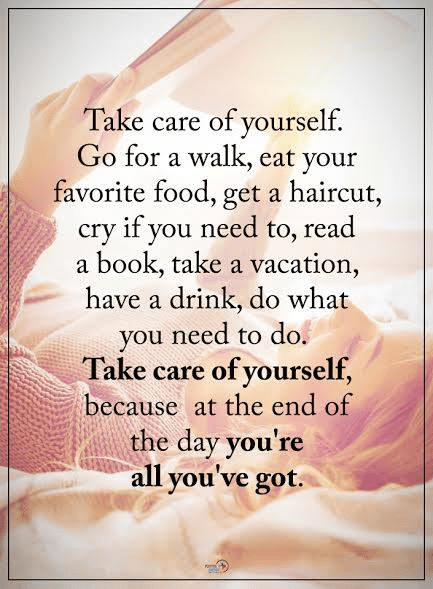When life gets challenging and stressful, we often push those feelings away. We are just keeping moving on with the things that need to get done. Many people have a mentality of pushing themselves through hard times. But that behavior can backfire. Sometimes, when stress gets too much, we risk putting ourselves through a nervous breakdown.
What is a nervous breakdown exactly?
According to Mayo Clinic, a nervous breakdown is “a stressful situation in which someone becomes temporarily unable to function normally in day-to-day life. It’s commonly understood to occur when life’s demands become physically and emotionally overwhelming. The term was frequently used in the past to cover a variety of mental disorders, but it’s used less often today.”
Remember to take care of yourself. You can’t pour from an empty cup.
Here Are 7 Warning Signs Of A Nervous Breakdown To Never Ignore
There are several early warning signs that people need to look out for when they’re at risk of a nervous breakdown. These signs should never be ignored, and help or support should be sought out as soon as you notice the symptoms.
1. Ill-managed mental health issues
If you have anxiety disorder, depression, bipolar, or personality disorders, you may be at greater risk for a nervous breakdown. That’s especially true if you don’t take charge of your mental health. While anyone can have a nervous breakdown, it’s more likely for people who have underlying mental health issues that aren’t under control. The first step to avoiding a nervous breakdown is to make sure that any underlying mental health issue is well-managed so that it doesn’t exacerbate the nervous breakdown.
2. Abuse of drugs or alcohol
Substance abuse is one of the significant signs of someone heading for a nervous breakdown. Much like the underlying mental health issue, substance abuse only makes the likelihood of a nervous breakdown that much more. If you find that you drink more than you should or use prescription drugs more often than your doctor recommends, you may need to seek out help before the use of the substances drives you to a nervous breakdown.
3. Extra stress that you can’t handle
Another early warning sign that points to a nervous breakdown is that your life has been extra stressful. Everyone has to deal with stress in their life, but perhaps your life has been full of extra stress lately – your job, your family, your relationship. When life throws us more than we can handle, it can be a precursor to having a nervous breakdown.
“In these cases, even someone who does not usually suffer from anxiety or depression can become overwhelmed to the point that they experience a mental health crisis,” says Heather Senior Monroe, MSW, LCSW, a social worker and director of program development at Newport Academy.
If you feel as if your life has been getting more stressful than you can handle, you’ll want to seek out a support system, or even maybe a therapist, who can help keep you in check.
4. Consistent panic attacks
If life is too much that you might have consistent or daily panic attacks. Indeed, this is a huge warning sign of a nervous breakdown. This is a result of your nervous system going into constant fight-or-flight mode because of all of the stress that you’re dealing with in your day-to-day life.
Psychotherapist Sally Brown says that, “When anxiety is left untreated, it can trigger panic attacks, overwhelming feelings of fear and danger that seem to come out of the blue. Once you’ve had an attack, worry about having another one can be more undermining to mental wellbeing than the attacks themselves.”
When this starts to happen, you need to make sure you have a support system that you can turn to who can help you. Or, find healthy coping mechanisms to make your stressful life easier. You may even want to seek out a therapist.
5. Numbness
When stress gets too much, we often no longer can feel the amount of stress that we’re going through. Instead of feeling panicky, anxious, stressed or upset, you may find that your feelings go away completely, and you start feeling numb instead. You may lose interest in your job, your family, your friends, or anything that you once enjoyed in your day-to-day life. This is a huge red flag that a nervous breakdown is on the horizon. So if you find you’re suddenly no longer interested in things, it’s time to seek help.
6. Normal life becomes too much
Of course, a stressful life can become unmanageable quickly. But when a nervous breakdown is on the horizon, even your everyday day-to-day life feels like it’s too much for you to manage. You can’t get up in the morning, taking a shower is hard, even getting to work feels impossible. You’re overstimulated by even the most mundane things, and it all feels like it’s too much for you to handle, “and social situations seem overwhelming,” states Monroe.
7. Suicidal thoughts
A big warning sign of a nervous breakdown is when you begin to have thoughts of suicide. That’s because it seems easier than dealing with all of the stress that life has thrown at you.
“Mental breakdowns are often preceded by ongoing feelings of doom and worry, perhaps even suicidal thoughts, or by what’s known as ‘hyperarousal,’—feeling tense and overstimulated as a result of the nervous system going into ‘fight or flight mode,” adds Monroe.
When you begin to contemplate suicide, you need to seek out a support system or a professional as soon as possible. They will help you with coping mechanisms, and your support system will be able to help you manage the stress in your life.
10 Self-Care Habits To Avoid Nervous Breakdown
1. Lower your stress
Stress is part of life. But sometimes it feels like everything comes crashing down at once, causing you to feel anxious and stressed out to the point of feeling like you’re going to have a nervous breakdown. It’s essential to come up with some strategies to help you lower your everyday stress levels. You can’t prevent all stress, but some things you do may add unnecessary stress to your life. Here are two simple things to incorporate into your daily life to lower your stress levels.
- Routine-Keep a working routine of when you get up, eat meals and go to bed. Having a routine brings peace so you can focus on more important things.
- Take breaks-It’s helpful to take breaks throughout the day to catch your breath and relax. Go outdoors to walk around or chat with a co-worker about something besides work.
2. Get enough sleep
Sleep has many significant benefits.
- Sleep helps you maintain your weight better-When you’re tired, you’re more likely to overeat for extra energy.
- Sleep strengthens your immune system- If you’re not getting enough sleep, you’ll get sick more.
- Reduces stress
- Improves your mood
- You can focus better
3. Exercise
Regular exercise is a self-care strategy to stave off an emotional breakdown. Exercise reduces stress, elevates your energy levels, and releases chemicals that make you feel happier and less anxious.
4. Focus on diet
Choose to eat healthy, nutritious foods to improve your mood. Choose whole foods such as fresh, healthy produce and lean meats. Eat less sugar, salt, and fat.
5. Mindfulness
Practicing mindfulness techniques helps you reduce your anxiety and stress. Focus on breathing, slow down your thoughts to release your worries.
6. Talk to a therapist
Find a reliable therapist to talk with about your feelings, concerns, and anxieties.
7. Believe
Extreme stress can trigger nervous breakdown symptoms like psychiatric disorders like a nervous breakdown. Researchers suggest that having faith in God acts as a buffer against stress. Individuals who practice religion are resilient. Having faith in God doesn’t mean you won’t feel depressed at times, but faith can help you as you walk through difficult situations less apt to have a nervous breakdown.
8. Get outside
Being outdoors lifts your mood. There’s something calming about being in nature, hearing birds, and enjoying the warmth of the sun. Interacting with nature lowers your stress, anxiety, and depression. Whether you like to garden or go for hikes, try to schedule some time outside every week.
9. Get into a community
Humans, by nature, are social creatures. Being in a community can help those who struggle with mental health issues. A community gives you
- A sense of belonging-Being with a group of people can help you feel included and accepted.
- Feeling supported-Communities support one another during difficult times. When you’re part of a community, you have people you can talk to about your problems. You’ll feel safe knowing they support you.
- A purpose-Being part of a community gives you a sense of purpose. Whether it’s making meals for one another, doing a community project together, or just hanging out together, community makes you feel like you’re part of something bigger than you.
10. Laugh more
A good belly laugh could be what you need to avoid a nervous breakdown. Laughter has short-term and long-term benefits. Laughing out loud creates physical and emotional changes in your body. Laughter can achieve the following:
- Increases your oxygen intake
- Stimulates your lungs, muscles, heart
- Increases endorphins which make you feel happier
- Relieves stress
- Lowers your blood pressure
- Relieves tension
- Increases relaxation
Final thoughts on Knowing the Signs of a Nervous Breakdown
No one should have to go through a nervous breakdown. If it can be avoided, learning the signs of when a nervous breakdown is near can help anyone deal with the stress in their lives that makes it unmanageable. Friends, family, and therapists can all be of great help when dealing with a nervous breakdown or making sure that you don’t ever have to go through one.

















 Community
Community

